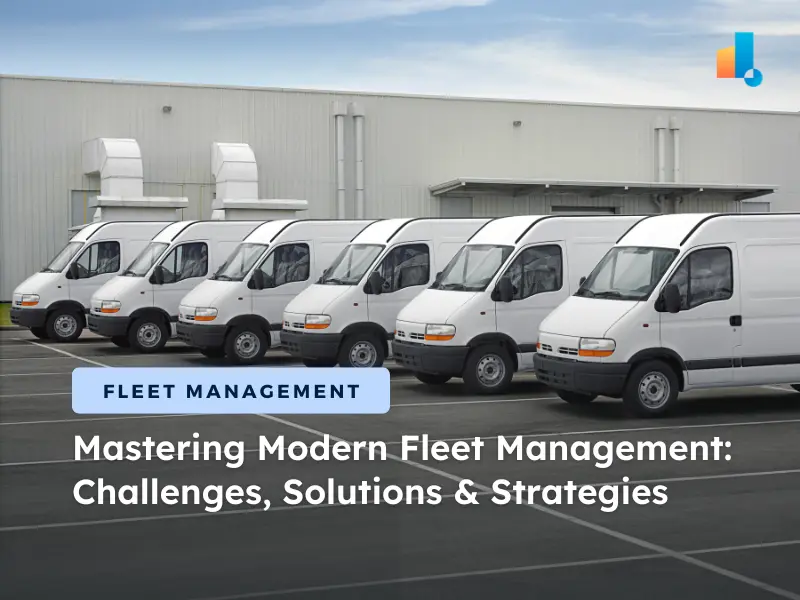Key Takeaways
Running a fleet management business today is not for the faint-hearted. Between skyrocketing fuel costs, supply chain disruptions, driver shortages, and unpredictable market shifts, fleet managers are navigating one of the most complex operating landscapes in decades. Add to that the sheer geographical diversity and infrastructural challenges, and it’s clear: fleet management now demands more than just good vehicles and timely deliveries.
It demands smart strategies, technology integration, and a forward-thinking approach to sustainability and driver welfare. In this article, we break down the current state of the fleet industry, the most pressing challenges fleet managers face, and practical, real-world solutions that can make the difference between merely surviving and truly thriving.
The Evolving Landscape of Fleet Management
Fleet operations today are undergoing significant shifts. Fuel prices are volatile, vehicle acquisition costs are soaring, and inflation is putting additional pressure on operating budgets. In parallel, new regulations around emissions, driver safety, and sustainability are becoming stricter globally.
Technology, however, is creating new opportunities. Artificial Intelligence (AI), machine learning, automation, and predictive analytics are tools fleet managers are using right now to gain better control over operations, costs, and outcomes.
Industry experts agree: while costs are unlikely to fall anytime soon, companies that leverage technology and implement proactive strategies can outperform competitors and protect their bottom line.
Why Fleet Management Matters More Than Ever
Efficient fleet management doesn’t just impact internal operations; it directly affects customer satisfaction, brand reputation, and long-term profitability. Here's why it’s critical:
- Cost Control: Reduces operational expenses like fuel consumption, maintenance, and insurance premiums.
- Driver and Vehicle Safety: Ensures safer journeys, lowering accident risks and improving driver wellbeing.
- Regulatory Compliance: Helps companies stay on the right side of evolving environmental and safety regulations.
- Customer Trust: Timely deliveries build credibility and loyalty.
In short, effective fleet management is no longer a backend operation. It’s a core pillar of modern business success.
The Top Challenges Facing Fleet Managers (and How to Solve Them)
%20-%20visual%20selection.webp)
Let’s look at the biggest obstacles fleet operators are grappling with and the strategies smart companies are adopting to stay ahead.
Managing High Operational Costs
The Challenge: Fuel, maintenance, insurance, and operational costs are climbing steadily, making it difficult to maintain profit margins.
The Solution:
- Leverage AI-powered fleet management platforms to monitor and reduce unnecessary expenses.
- Deploy predictive maintenance tools to avoid costly vehicle breakdowns.
- Monitor driver behavior to reduce fuel wastage and wear-and-tear.
- Companies like Tourmo AI are leading the way by helping fleets cut operational costs by up to 20%.
Key Takeaway: Regularly audit your fleet operations and invest in smart technologies that deliver clear, measurable savings.
Supply Chain Disruptions
The Challenge: The aftermath of the COVID-19 pandemic, rising material costs, and global economic uncertainties continue to disrupt supply chains, causing delays and inventory issues.
The Solution:
- Automate inefficient, manual processes to free up resources.
- Use AI tools to forecast demand, plan maintenance better, and improve fleet utilization.
- Build strong supplier relationships and diversify your supply chain sources where possible.
Key Takeaway: You can't control global supply chains but you can control internal efficiencies and responsiveness.
Download our free Fleet Automation Readiness Checklist
Fuel Management
The Challenge: Fuel theft, fraud, and soaring fuel prices can cripple a fleet’s profitability.
The Solution:
- Invest in advanced telematics and fuel card systems.
- Track fuel transactions automatically to identify suspicious patterns.
- Transition to hybrid or electric vehicles where feasible.
Key Takeaway: Real-time tracking and smarter driver training can deliver huge fuel savings over time.
Route Optimization
The Challenge: Traffic congestion, unexpected road closures, and poor infrastructure (especially in rural or mountainous regions) can cause major delays and cost overruns.
The Solution:
- Utilize GPS tracking with real-time traffic insights.
- Incorporate AI-powered route planning to avoid congested or unsafe areas.
- For difficult terrains (like mountainous or rural areas), use robust vehicles and hire locally experienced drivers.
Key Takeaway: The shortest route isn’t always the fastest; dynamic route optimization is critical.
Health and Safety Issues
The Challenge: Driver fatigue, harsh weather conditions, and road hazards (like potholes or landslides) increase the risk of accidents.
The Solution:
- Prioritize driver training programs focusing on safety, defensive driving, and terrain-specific risks.
- Implement strict vehicle maintenance schedules.
- Provide drivers with real-time weather updates and emergency protocols.
Key Takeaway: Safe drivers are productive drivers and they save companies money and reputational damage.
Compliance and Regulations
The Challenge: Regulatory requirements around vehicle emissions, safety standards, and driver working hours are constantly evolving.
The Solution:
- Automate compliance reporting using fleet management software.
- Stay updated on local and international fleet regulations.
- Regularly audit your operations to identify compliance gaps.
Key Takeaway: Proactive compliance is a competitive advantage.
Maintenance and Vehicle Longevity
The Challenge: Neglecting regular maintenance leads to costly breakdowns and disrupts operations.
The Solution:
- Use vehicle diagnostic tools to predict maintenance needs before problems arise.
- Implement scheduled maintenance programs based on mileage and vehicle usage patterns.
- Protect vehicles in harsh terrains (like coastal or mountainous regions) with anti-corrosion treatments and specialized equipment.
Key Takeaway: Preventive maintenance saves you more money than reactive repairs ever will.
Future-Proofing Your Fleet Management Strategy
Fleet management will only become more complex over the coming years but also more rewarding for those who adapt. Companies that invest in cutting-edge technology, prioritize driver and vehicle safety, embrace sustainability, and constantly optimize their operations will not just survive; they will lead the future of transportation.
The challenges are real. The stakes are high. But so are the opportunities. The road ahead belongs to the fleet managers who are ready to drive smarter, faster, and greener.
Ready to take your fleet management to the next level? Partner with Simply Fleet today and future-proof your fleet management!



.png)








.png)


.png)
%20(1).avif)






